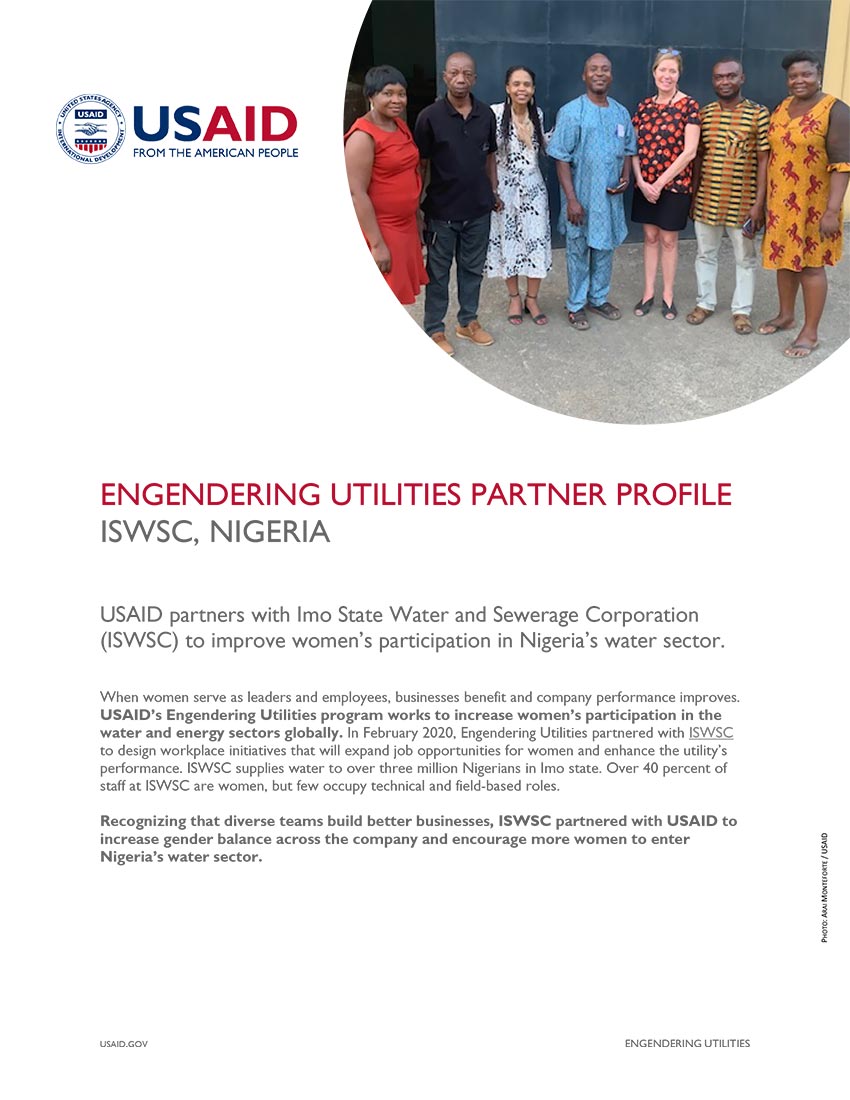- Energy Home
- How We Work
- Programs & Initiatives
- Smart Utilities
- Asia EDGE
- Auction Design Support to Colombia
- Energy Auctions for Kazakhstan’s Green Economy
- Energy Efficiency for Development
- Engendering Utilities
- About
- Business Case
- Approach
- Partners
- OSHEE, Albania
- SONABEL, Burkina Faso
- EDESUR, Dominican Republic
- DELSUR, El Salvador
- EEU, Ethiopia
- Energo-Pro, Georgia
- GRIDCo, Ghana
- BRPL, India
- TPDDL, India
- EDCO, Jordan
- IDECO, Jordan
- Miyahuna, Jordan
- KenGen, Kenya
- Kenya Power
- KOSTT, Kosovo
- LEC, Lesotho
- LEC, Liberia
- EGENCO, Malawi
- EDM, Mozambique
- EKEDC, Nigeria
- IBEDC, Nigeria
- ISWSC, Nigeria
- EVN, North Macedonia
- LASURECO, Philippines
- ZCWD, Philippines
- REG, Rwanda
- OFOR, Senegal
- Senelec, Senegal
- EVN, Vietnam
- Resources
- Stories
- Institutional Framework for Auctions in Mexico
- Powering Agriculture
- The USAID-NREL Partnership
- Scaling Up Renewable Energy
- EmPOWERing Women and Girls
- Competitive Energy Procurement
- Toolkits
- Monitoring & Evaluation
- Resources
- Stories
Speeches Shim
Engendering Utilities Partner Profile
ISWSC supplies water to over three million Nigerians in Imo state. Over 40 percent of staff at ISWSC are women, but few occupy technical and field-based roles.
While 70 percent of Nigeria’s population has access to basic water services, only 20 percent have access to safe water. Migration, urbanization, and rapid population growth have strained government efforts to deliver safe drinking water to Nigeria’s urban areas, where half of the country’s 185 million people have migrated over the past several decades. In 2018 the government of Nigeria developed the Water and Sanitation National Action Plan, and declared a state of emergency in the water, sanitation and hygiene (WASH) sector. The action plan outlines a five-year emergency response strategy and long-term plan to improve access to water and sanitation services across the country. Engendering Utilities’ work with ISWSC will ensure women can capitalize on increased investment in Nigeria’s water sector as the government scales services to meet the needs of all Nigerians.
A complex web of contributing factors prevents women in Nigeria from joining the formal workforce, particularly the male-dominated water sector. Less than half of Nigerian women participate in the labor force, and only 13 percent of working women are wage or salaried workers. Women are under-represented in higher-paid positions, and Nigeria’s gender pay gap is one of the highest in the world, with men earning 54 percent more than women. Engendering Utilities is supporting ISWSC to consider and respond to factors that reduce women’s workforce participation by building inclusive policies and practices that benefit men, women, and businesses in the water sector.
USAID is supporting ISWSC towards their goal of becoming a pioneer in gender equality among state-level water boards by providing change management coaching and leadership training, conducting a baseline assessment to identify gaps and opportunities for gender equality, and developing a strategic plan with ISWSC to facilitate the company’s gender equality goals.
USAID will also work to support and accelerate existing gender equality initiatives underway at ISWSC, including:
- Review of the Equal Employment Opportunity Statement and HR Manual, which expresses and formalizes corporate commitment to gender and social inclusion, to ensure strong gender integration.
- Develop a Male Engagement Strategy, which identifies and supports male leaders as champions of gender equality at ISWSC.
- Increase Recruitment of Female Students, based on the utility’s recognition that female students are excelling in areas such as engineering, the company is eager to hire and support this burgeoning female talent.


Comment
Make a general inquiry or suggest an improvement.